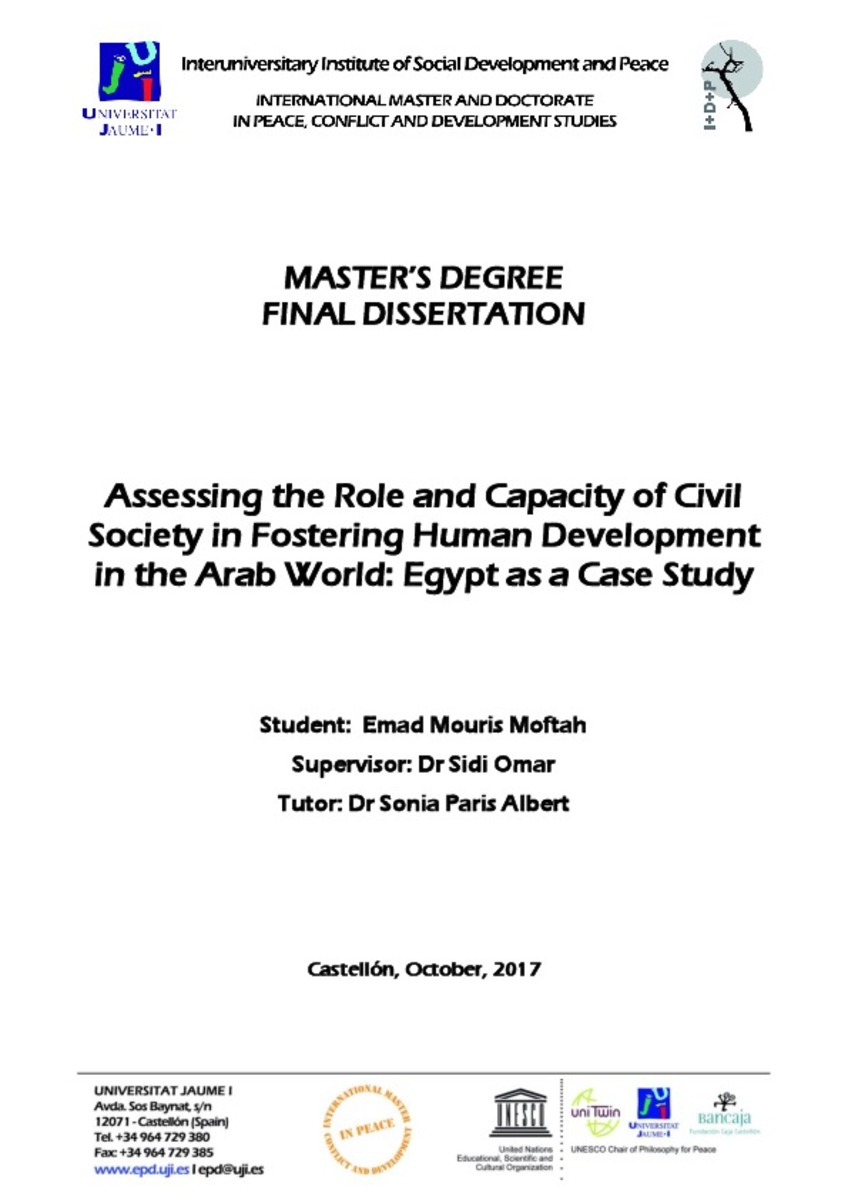Mostrar el registro sencillo del ítem
Assessing the Role and Capacity of Civil Society in Fostering Human Development in the Arab World: Egypt as a Case Study
| dc.contributor.author | Moftah, Emad Mouris | |
| dc.contributor.other | París Albert, Sonia | |
| dc.contributor.other | Omar, Sidi | |
| dc.contributor.other | Universitat Jaume I. Departament de Filosofia i Sociologia | |
| dc.date.accessioned | 2018-03-26T13:52:47Z | |
| dc.date.available | 2018-03-26T13:52:47Z | |
| dc.date.issued | 2017-10-16 | |
| dc.identifier.uri | http://hdl.handle.net/10234/173711 | |
| dc.description | Treball Final de Màster Universitari en Estudis Internacionals de Pau, Conflictes i Desenvolupament (Pla de 2013). Codi: SBG119. Curs acadèmic: 2016/2017 | ca_CA |
| dc.description.abstract | Over the past thirty years, both concept and role of civil society have been under noticeable evolution due to the political, economic and social conception development that globalisation and its dynamics brought about. In the West, the civil society has developed an influential role in the human development’s policymaking, implementation and evaluation. Civil society in the liberal democratic countries is considered as partner to both governments and private sector in human development. The strength of the Western civil society due to its enabling environment such as democracy and cultural settings. While the Arab civil society is still lagging behind despite the fact that its size and volume of received foreign funds both are increasing. The Arab uprisings had brought to the light many questions than answers about the capacity and credibility of the Arab civil society in making positive social change. In this thesis, the Arab civil society and its domestic and external environment both will be revisited and analysed in order to identify its weakness and challenges as well as its strengths and opportunities. In Egypt, for instance, it is highly noted that the more the size and funds of civil society organisations increases, the more the poverty and social unrest increases. In this research, Egypt is presented as a case study, with an intent to approach the civil society through anatomising its political, economical, cultural and social context. The methodology applied in this research is a combination of different perspectives and analysis of different researchers and field experts from inside as well as outside the Arab region. The research reveals that the capacity of the Arab civil society is not fully optimised, as it identifies the cultural factor as a key challenge. This study is vital to the understanding of the obstacles that Arab civil society faces, especially the domestic challenges. | ca_CA |
| dc.format.extent | 159 p. | ca_CA |
| dc.format.mimetype | application/pdf | ca_CA |
| dc.language.iso | eng | ca_CA |
| dc.publisher | Universitat Jaume I | ca_CA |
| dc.rights | Atribución-CompartirIgual 4.0 Internacional | * |
| dc.rights.uri | http://creativecommons.org/licenses/by-sa/4.0/ | * |
| dc.subject | Máster Universitario en Estudios Internacionales de Paz, Conflictos y Desarrollo | ca_CA |
| dc.subject | International Master in Peace, Conflict and Development Studies | ca_CA |
| dc.subject | Màster Internacional en Estudis de Pau, Conflictes i Desenvolupament | ca_CA |
| dc.title | Assessing the Role and Capacity of Civil Society in Fostering Human Development in the Arab World: Egypt as a Case Study | ca_CA |
| dc.type | info:eu-repo/semantics/masterThesis | ca_CA |
| dc.educationLevel | Estudios de Postgrado | ca_CA |
| dc.rights.accessRights | info:eu-repo/semantics/openAccess | ca_CA |
Ficheros en el ítem
Este ítem aparece en la(s) siguiente(s) colección(ones)
-
TFM: Màster Universitari en Estudis internacionals de Pau, Conflictes i Desenvolupament [225]
SAA074; SBG119; SBG120; MAA074








